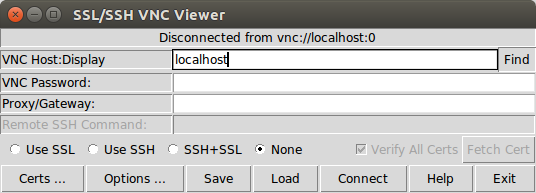Barebone Ubuntu 14.04 Cloud Desktop
Since I have found some issues with my previous LXQT setup in real-life work I decided to fall back to standard Lubuntu for my cloud desktop. As part of this I also switched to TightVNC which seems a lot easier to configure.
Add local user account
adduser USERNAME
adduser USERNAME sudo
Install Lubuntu Desktop
sudo apt-get install --no-install-recommends lubuntu-desktop tightvncserver
TightVNC Configuration
sudo vim /etc/lightdm/lightdm.conf
#
# VNC Server configuration
#
# enabled = True if VNC connections should be allowed
# port = TCP/IP port to listen for connections on
#
[VNCServer]
enabled=true
port=5900
width=1366
height=768
depth=24
sudo /etc/init.d/lightdm restart
Connect to the remote system
ssh -L 5900:localhost:5900 -i /path/to/your/aws/keyfile.pem YOUR.EC2.IP.ADDRESS

Accessing your cloud desktop from Chromebook
One of the main reasons for setting up a cloud desktop is that I tend to use a lot of different devices some of which are not very powerful.
One of my favorite devices of late has been a HP 11 Chromebook. I originally bought it for a new employee and wanted to check myself how this thing stacks up to do day-to-day computing tasks more efficiently than a standard laptop without all the headaches of running Windows (viruses, endless driver installs, bloatware, malware, …). We already have several people at work working exclusively from Chromebooks and they absolutely love them. Long story short – I ended up keeping the Chromebook for myself as it’s an absolutely great secondary device for me. I can carry it with me everywhere (doesn’t weigh much more than a tablet, roughly the same size as a tablet & has a keyboard and is so much more useful than a tablet).
Installing Poptop (pptpd) VPN Server on CentOS 6
For roaming mobile clients PPTP (Point-to-Point Tunneling Protocol) is still the quickest way to get VPN connections to tunnel traffic over a secure link.
Installation
I always prefer installation via a yum repository as this will ensure patches are applied during regular system updates
sudo rpm --import http://poptop.sourceforge.net/yum/RPM-GPG-KEY-PPTP
sudo rpm -Uvh http://poptop.sourceforge.net/yum/stable/rhel6/pptp-release-current.noarch.rpm
sudo yum install ppp pptpd -y
Configuration
Note: replace $USERNAME and $PASSWORD with actual values
IP configuration
echo "localip 192.168.0.1" >> /etc/pptpd.conf
echo "remoteip 192.168.0.100-199" >> /etc/pptpd.conf
DNS configuration